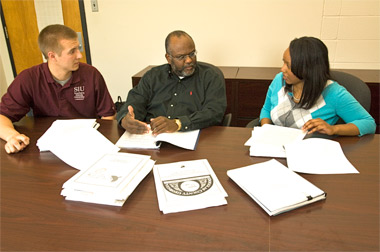
Refuse impact -- Scott Polczynski (left) a junior accounting major from Du Bois, works with Royce Burnett, associate professor in accounting, and Diamond Garner, a master’s in accounting student from Chicago, on a research project studying the economic and environmental sustainability of counties. (Photo by Steve Buhman) Download Photo Here
May 16, 2012
Study explores landfills' impacts on counties
CARBONDALE, Ill. -- Even the best efforts to create a “green” society can’t totally eliminate trash, it seems. It’s got to go somewhere, and the ‘where’ has repercussions, good or bad.
Royce D. Burnett, the KPMG Research Professor in Accountancy in SIU Carbondale’s College of Business, is working with two students on a research project that looks at the dual factors of economic and environmental sustainability in counties. The team is assessing the extent to which county refuse and landfill management activities as well as public awareness of those activities affect economic development.
Working with Burnett on the research project are Diamond Garner, a master’s in accounting student from Chicago, and Scott Polczynski, a junior accounting major from DuBois.
“There’s always garbage. It just doesn’t go away. It has to go somewhere. Our research is studying how you account for and manage garbage and how that affects the way a county is perceived and potentially its economy,” Burnett said.
Burnett is basing his study on data from the 1,000 most populated counties in the nation according to the 2000 census numbers. Just collecting the data is a huge task and as they gather the information, they’re also exploring another aspect. Some counties post their comprehensive annual financial reports online where they are readily accessible and others do not. Burnett said the accessibility of details and willingness of counties to share information is one component of the study.
Then, using data for the years 2005-2008, Burnett and his assistants are going to analyze the information in a number of ways. They will look at health care, education, and other services each county provides and see how they manage it all fiscally. Then, when there are landfills involved, they also will look at the revenues and expenditures involved currently and also in light of long-term planning, since by law monitoring a landfill must go on for at least 30 years after a facility closes.
“Particularly in today’s economy, our governments have many demands on their limited resources so it’s important that they have adequate information to be able to better manage the funds they have,” Burnett said.
On the one hand, landfills frequently provide host fees, jobs and other income to a county. On the other, there are a number of costs incurred in overseeing operations and the potential that a landfill could positively or negatively affect a county’s economic development. How does a landfill affect the economic development and economic performance of a county? Burnett believes his work will answer that question and many more.
“At the end of the day it all comes back to being able to make more informed decisions regarding resource allocation and management. The information from this research will enable county governments to have the knowledge to plan for today and for their long-term future, to make decisions and budget properly to assure their county continues to operate soundly, from a perspective that takes into account fiscal, health care, environmental, service and other factors,” Burnett said.
Burnett and his team aren’t drawing any conclusions at this time, as there remains much research work to do. But, they are confident that regardless of what the research shows, it will prove valuable to counties and governmental entities as they make future decisions regarding waste management and the financial implications.
In the meantime, the work is already providing a valuable learning experience, they say. Polczynski was anxious to explore research possibilities upon his arrival at the University and is learning a lot through his work with Burnett, he said.
“I’m really building my communication and teamwork skills,” he said. With plans to go on to earn his master’s degree in accounting at SIU Carbondale and become a CPA, Polczynski said he believes the research and the skills he’s honing will be beneficial to his future clients.
Garner got involved in the project through her graduate dean’s fellowship and said it’s taught her a lot already.
“I’m gaining a lot of knowledge about landfill accounting and disclosures and this is the kind of information and experience that is very important in the real world,” Garner said.
She will wrap up her master’s coursework in June. Garner already landed a position with Deloitte Tax LLC in Chicago as a tax consultant and she’s convinced that her hands-on learning regarding financial statements, disclosures and county records and accounting will benefit her, her clients, and those who will ultimately learn from the research.
